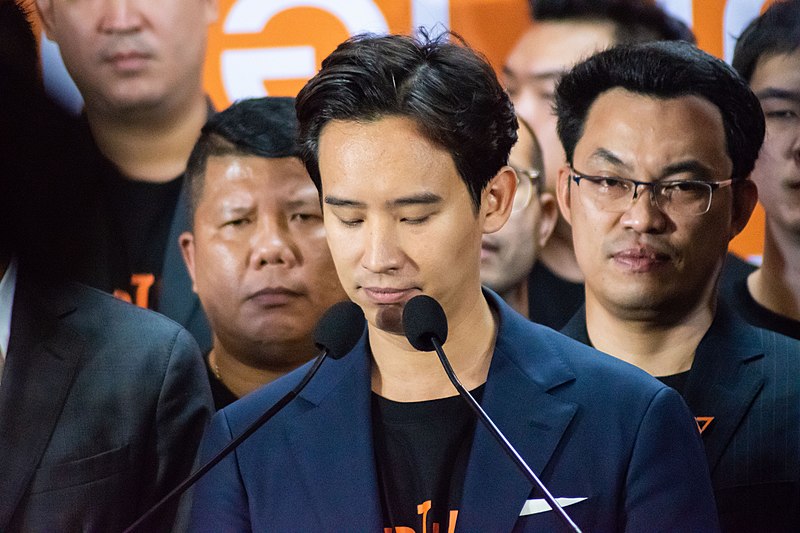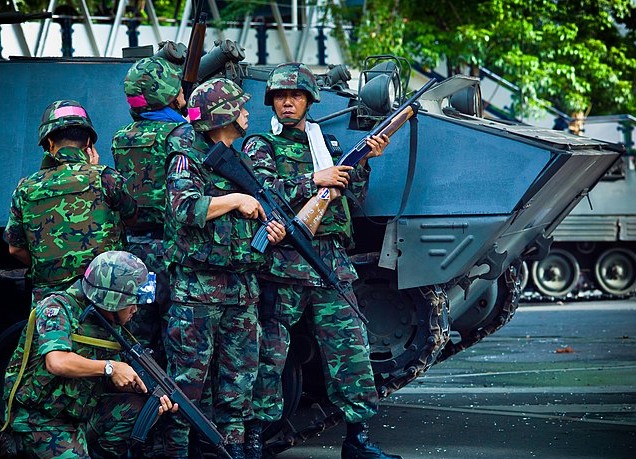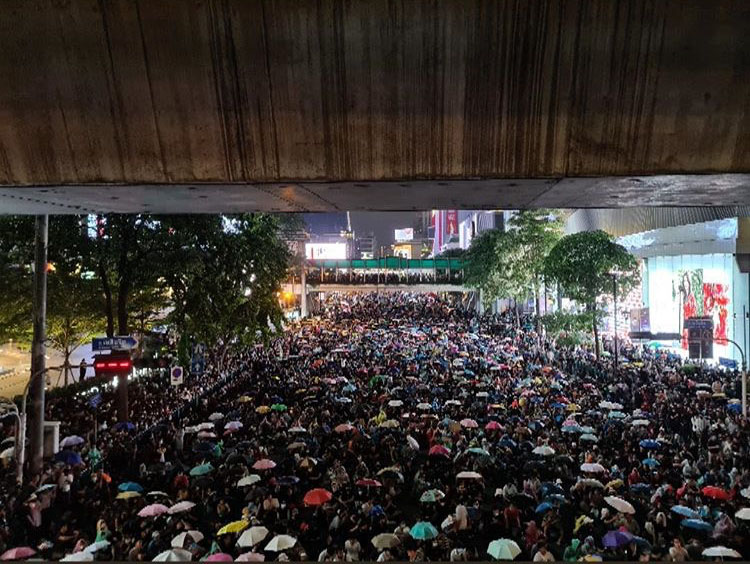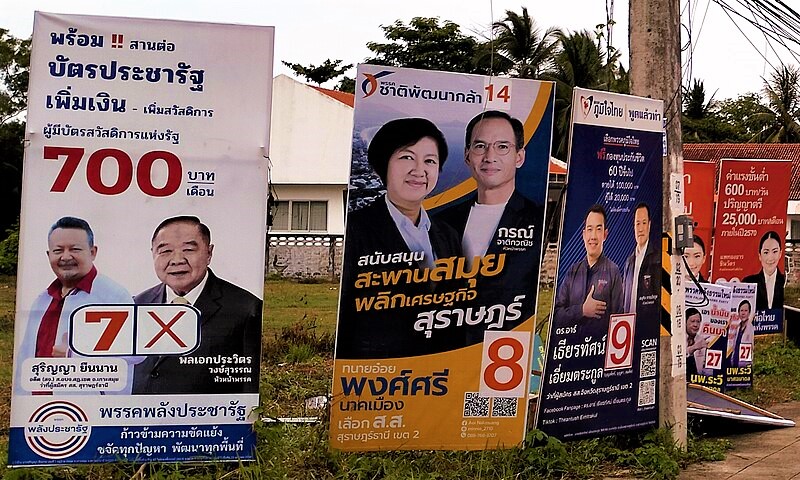On 14 May, almost 40 million Thais stepped up to the ballot box. The result: a clear rejection of the ruling royalist-military junta. Unofficial figures from the election commission show the two main opposition parties, Pheu Thai and the Move Forward Party, collectively received 25 million votes. A royalist coalition of Palang Pracharath, Bhumjaithai, and Democrat parties, along with a handful of smaller parties, including the new United Thai Nation Party of incumbent Prime Minister Prayut Chan-o-cha, were soundly defeated.
While presenting themselves as ‘pro-democracy’, Both Pheu Thai and the Move Forward Party are bourgeois in character, openly advocating for free market policies, and would faithfully represent the parasitic capitalist ruling class in power. Moreover, they are already jettisoning their democratic pledges.
Nevertheless, this election has seen the Thai masses use the available means to express their firm rejection of the ruling military clique and royalist establishment, a mood that has boiled over into major protest movements in recent years.
Move Forward and Pheu Thai
Junta PM Prayut Chan-o-cha first came to power in a military coup in 2014, and was then 'elected' in 2019 on the basis of the 2017 constitution, which was written by, and rigged in favour of, the royalist-military junta. The level of opposition to this rotten regime is not a surprise.
Less expected was the success of the recently formed Move Forward party: a new incarnation of the Future Forward party, which was forced to dissolve by the Constitutional Court after their success in the 2019 elections.
 Move Forward ran on a programme that emphasised the “3Ds” of “demilitarisation, demonopolisation, and decentralisation” / Image: Sirakorn Lamyai, Wikimedia Commons
Move Forward ran on a programme that emphasised the “3Ds” of “demilitarisation, demonopolisation, and decentralisation” / Image: Sirakorn Lamyai, Wikimedia Commons
Move Forward ran on a programme that emphasised the “3Ds” of “demilitarisation, demonopolisation, and decentralisation”, along with social policies appealing to young, urban-dwelling Thais, including the legalisation of same-sex marriage and scrapping conscription to the military.
They also called for a referendum on rewriting the constitution and “reforming” the monarchy, amongst economic reforms.
Most anticipated a landslide victory for the Pheu Thai party, which had polled very strongly in the months leading up to the election, at between 40 and 50 percent. But on election day, they received less than 30 percent, losing a lot of support among the youth in Thailand's two largest cities Bangkok and Chiang Mai to the Move Forward party.
Pheu Thai, however, remains popular in the poorer and rural north. Especially in the north-east, where the policies of the party's founder Thaksin Shinawatra during his time as Prime Minister from 2001 to the 2006 military coup are remembered fondly.
This was a period during which incomes in the area increased by 46 percent, and poverty was nearly halved in the country as a whole. Thaksin was able to fund these policies with Keynesian spending, while at the same time lowering government debt, during a period when the Thai economy was recovering from the 1997 crisis, with GDP growth averaging 5 percent per year.
A probable cause for the Pheu Thai's loss of support is their ambivalent position on the despised Section 112 of Thai Criminal Code. This section concerns Thailand’s strict lèse-majesté laws, criminalising defamation, insults or threats towards the Royal Family, with punishment ranging from three to 15 years in prison, and has long been used by the ruling elite against political dissidents.
Recently, it was used to detain and imprison leaders of the 2020-2021 anti-monarchy protest movement. It has also been used as justification for some of the numerous coups that have hit Thailand in the last century, like the one in 2006, which deposed Thaksin. Despite the level of opposition in Thai society, Pheu Thai did not commit to changing the law, with Thaksin saying that the issue is not with the law itself but with how it is enforced!
The Move Forward Party seized all but one constituency in Bangkok, which prior to 2019 had been a Democrat (i.e. royalist) stronghold. Even in the 2019 elections, the city was split between the predecessor of the Move Forward Party, the Pheu Thai and the military junta's Palang Pracharath Party.
This development suggests that the Move Forward Party, with its clear opposition to the lèse-majesté laws (at least during the campaign), not only won over a large section of the youth from the Pheu Thai Party, but also managed to win support among the traditionally royalist urban petty-bourgeoisie, which constituted the rank-and-file of the anti-democratic reactionary Yellow Shirt movement. This is a major turn in the situation.
Crumbling support for royalist-military junta
This loss of support for the monarchy and the royalist-military establishment among its typical base is a reflection of growing discontent amidst a worsening economic situation.
Tourism (Thailand’s main industry) is a long way from recovering to its pre-pandemic level. The country also faces surging energy prices and household debts, at 87.5 percent of GDP, among other issues. All of this is causing profound division in the ranks of royalist-military supporters.
There have also been high-profile defectors, including an MP elected for the Move Forward party in Bangkok, who openly admitted to previously taking part of the Yellow Shirt movement and cheering on the military coup in 2014!
 The loss of support for the monarchy and the royalist-military establishment is a reflection of growing discontent / Image: Ronald Dobbins, Wikimedia Commons
The loss of support for the monarchy and the royalist-military establishment is a reflection of growing discontent / Image: Ronald Dobbins, Wikimedia Commons
Undoubtedly, the Move Forward Party gained much popularity due to their pledge to limit the power of the royalist-military elite by reforming Section 112, ending the mandatory conscription and calling a referendum on amending the pro-junta constitution.
In addition to these democratic demands, many of its proposed economic policies are faintly reminiscent of the Thaksin government of 2001-2006. These include increases to the daily minimum wage, reduced electricity costs, fixed fares for buses and urban trains and debt relief for elderly farmers.
In a 2022 poll by Statista, 65 percent of Thais saw the economic situation as the most important issue in the country. This is clearly reflected in the campaign promises by all the main political parties.
However, the crisis-ridden Thai economy does not allow for the kind of policies that gave the Pheu Thai Party authority in the past. Real GDP growth has been slowing down, while government debt in relation to GDP has more than doubled since 2006.
At the same time, the regular floods and droughts, which greatly affect the agricultural sector employing about a third of the population, are likely to increase in severity due to climate change.
Still, the stronger-than-expected support for Move Forward shows the potential for a political alternative. A genuine workers’ party, armed with a programme of consistent opposition to the reactionary monarchy-military junta, and of socialist transformation of society, could rapidly win a base of support in these conditions.
Whither Thailand?
Having received the most seats in the election, the Move Forward Party announced on 22 May their party leader Pita Limjaroenrat as candidate for Prime Minister, supported by a coalition of the Move Forward Party, Pheu Thai and six other anti-junta parties.
The coalition agreement, however, makes no mention of reforming Section 112. Even with such a large concession to Move Forward’s reactionary coalition partners – a major betrayal of its campaign pledges for democratic reform – Pita becoming Prime Minister is far from certain.
Although the coalition would have a clear majority in the parliament, with 313 out of 500 seats in total, according to the junta's 2017 constitution, the Prime Minister must be elected together with the 250 senators appointed by the royalist-military junta.
In order to bypass the senate, Pita would need the support of 376 members of parliament, which is not possible without including in the coalition the conservative junta-friendly Bhumjaithai party, an alliance that would come with the price of even more concessions.
One thing is for sure: any attempt to limit the influence of the royalist-military establishment, or to reform Article 112, will be met with fierce resistance from the ruling clique, who have always used these powers as a reserve weapon to maintain their privileges and capitalist rule.
 The only power in Thai society that can stand up to the ruling elite is the organised resistance of the masses of youth, workers and peasants / Image: Milktea2020
The only power in Thai society that can stand up to the ruling elite is the organised resistance of the masses of youth, workers and peasants / Image: Milktea2020
However, they are also frightened of the rage that an outright military coup would provoke from the Thai masses. Therefore, they are more likely to stage a judicial coup through the junta-controlled courts and the election commission.
A possible avenue would be to have Pita disqualified through a complaint to the electoral commission, based on allegations that he owns undeclared shares in a media company. Just like in 2019, the election commission will likely delay releasing official election results for as long as possible in order to buy time.
The bourgeois opportunists are incapable of winning even elementary democratic reforms. The only power in Thai society that can stand up to the ruling elite is the organised resistance of the masses of youth, workers and peasants.
Time and time again, they have shown their bravery and resolve in this struggle. Despite numerous movements, in which the masses have displayed great heroism in facing imprisonment and even death, the royalist-military establishment still clings onto power.
The bourgeoisie and petty-bourgeois leaders have consistently surrendered to the ruling elites, calling for faith in the courts, constitution and parliamentary system, which serve the junta.
No trust can be placed in the billionaire Shinawatra family or businessman Pita Limjaroenrat, who is already rowing back on his promises in regards to Section 112. The masses must rely on their own strength, and importantly must involve the working class as an organised force.
A movement like the one in 2020-2021, combined with a general strike, would put immense pressure on the ruling class and the junta where divisions have appeared at the tops. Armed with a socialist programme to deal with the cost of living, household debts and all the other pressing concerns for Thai workers and youth, such a movement could gain broad support.
Only through a total uprooting of the current system can Thailand finally rid itself forever of the junta and their stooges. The Thai masses must seize the assets of the ruling class, the richest of them all being King Vajiralongkorn himself, and put them to use for the common good!

